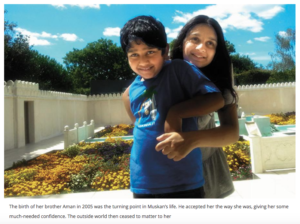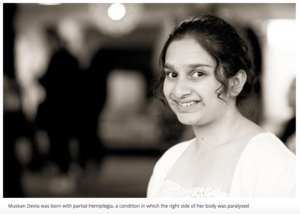13-year-old Muskan Devta was the youngest nominee for the Pride of New Zealand Award this year. And with good reason
On a Sunday morning in June, Muskan Devta’s energy is infectious. She looks like any other 13-year-old, dressed in a pair of shorts and a T-shirt. A grade nine student of Westlake Girls’ High School, she lives with her parents and younger brother in a leafy suburb of Auckland.
But that is about as close to a regular teenager that Muskan gets: In May, she was anonymously nominated for the Pride of New Zealand Award 2014, making her the youngest nominee ever. She was nominated under the category ‘Fundraiser of the Year’. Although she did not win (the results were announced in the first week of August), what has brought Muskan to the threshold of this recognition is a journey replete with hurdles—physical and emotional—that she has sailed over.
Born in Ahmedabad, Muskan was a premature baby, with a condition that is referred to in medical terms as partial hemiplegia; it means one side of the body—in her case the right side—was paralysed. In addition, she had underdeveloped lungs, feeble eyesight, and a hole in her heart.
With so many complications, doctors did not expect her to survive for more than a hundred hours. They were worried that her brain may not instruct her lungs to breathe and her heart to function. “Those were the most excruciating four days of our lives,” says Jaimini, Muskan’s mother.
Muskan, meanwhile, is more concerned about Tiger Shroff. After considering several other Bollywood releases, we settle down to watch the debutant’s film. After learning, with some dismay, of my limited knowledge of the actor, she offers to educate me with all the Bollywood trivia she has gathered about her “current crush”. Muskan then goes on to list the other “heroes” she would love to meet some day; it includes television star Harshad Arora, and actor Paresh Rawal. Somehow, Narendra Modi, too, features in it.
Muskan’s parents decided to immigrate to New Zealand when she was four years old, “to provide her with a child-friendly environment with better medical and support facilities,” says Jaimini.
As a child with special needs, Muskan had to wear braces on her right leg and thick spectacles; her movements were slower than other children her age. “Nobody would want to play with me during lunch time and I would wander around school by myself,” remembers Muskan. Making friends became difficult. “It wasn’t easy to not get affected and not become sad. But how can I expect anybody to accept me when I could not accept myself?” Profound.
It is this acceptance of her reality that keeps Muskan going, says Jaimini. But the big turning point in her life was the birth of her brother Aman on June 5, 2005. (“I chose his name,” claims an excited Muskan). “All that society expected from Muskan, her baby brother never did. He accepted her the way she is. This made Muskan confident and made her more caring towards him,” says Jaimini. Muskan says the outside world ceased to matter to her because she knew that when she went home, she would have his company. “Their bonding has only grown stronger,” adds Jaimini.
The limited amount of social activities in Muskan’s life as a primary school student transformed her into a bookworm. “I found solace in books and in the company of mum who was always there for me,” she says. Muskan ended up spending long hours in the school library.
I am pulled back to the present, as Muskan (Chikoo, or simply Koo, to her parents) launches into tales of her extended family back in India: Aunts, uncles, a cousin she is so close to that they “look like twins”. I am guided through family photographs that adorn the walls of the house. Although the Devta family in Auckland has not been to India for a while, family bonds hold strong, courtesy Skype.
There are different kinds of families. And Wilson Home, a charitable trust for special children in Auckland, is one of them. When the Devta family arrived in Auckland, Muskan started her regular visits—three to four times a year—to Wilson Home. This was the beginning of a close bond between her and her orthopaedic surgeon Terri Bidwell and physiotherapist Jo Walker. When Muskan was nine, during one of her visits to Wilson Home, she learnt that the institution was in need of an exercise bike. Instinctively, she wanted to chip in.
On her way home, she started brainstorming with Jaimini about what she could do to help her beloved Jo and her colleagues. She decided to write a book and sell it to raise money. “It was a decision made at the spur of the moment,” says Muskan. But, given her love of books, an obvious one too. Fed on a steady diet of mythological tales by her grandmother back in India, Muskan decided to write the story of how Ganesha, the god of wisdom and success, got an elephant’s head. Called The Story of Ganesha, the book sale—supported by her family and friends within the Indian community in Auckland—raised enough money to help Wilson Home buy the equipment it needed. “This experience instilled in me the confidence and the value of helping others,” says Muskan

But despite this, she continued to remain shy at school. “Social acceptance continued to be of critical importance in her pre-teen years,” says Jaimini. Her teachers at school said that despite her command over the English language, Muskan would not talk much and would not make any attempt at making friends.
An opportunity to overcome this limitation came in the form of an offer to anchor a programme for an Indian community radio station called Radio Tarana. The radio station had heard of her when a local newspaper interviewed her after the publication of her first book. Later, when Radio Tarana invited her to their studio for an interview, the programme manager was impressed by her command over Hindi. In 2012, Muskan became the youngest radio jockey in New Zealand, and her programme, aimed at children, had a worldwide audience of approximately 52,000. Although academic commitments made it difficult for her to continue with the weekly programme called You and Muskan beyond mid-2013, it allowed Muskan to come up with a theme to talk about, and take in song requests and birthday messages from children.
Having control over the content of a radio programme and deciding on how to conduct it, albeit with adequate training from the programme manager, boosted the then 12-year-old’s self-confidence like never before. A year later, she also became the youngest columnist for a community newspaper, after one their journalists came to interview the budding writer and was impressed by her ingenuity.
These instances of acceptance from random strangers helped Muskan get recognition among her peers, and she started taking on leadership roles at school. It helps that she also scores top grades in science and language courses. “It is just that I don’t like math too much,” says Muskan with a frown. Jaimini says, “She really cares for her classmates, and everybody at school. Most days, during lunch hour, she helps out other children with their studies and often comes home with her lunch untouched.” Muskan chips in: “I do it because I missed it when I was younger. And helping others make you special to those who benefit from you. It feels good to be special!”
After Muskan turned 13 last October, her doctors at Auckland Starship Hospital decided to perform a surgery to realign her right foot and lengthen the calf muscles. With severely restricted movement, Muskan wanted to do something productive, and decided to write the story of her life as a child with special needs. In another eight months, i dream was ready to be published, and Muskan decided to donate the proceeds of its sale to Starship Hospital for the treatment of children suffering from a condition similar to hers. While Jaimini’s employer, Bank of New Zealand, offered to sponsor the book, Fastway Couriers, where Muskan’s father Arun is employed, offered to deliver the book free of cost to buyers. In the next few months, Muskan was able to donate NZ$2,500 to the hospital.
Today, grade nine students at Westlake Girls’ High School in Auckland study i dream as part of an English unit titled ‘Courage’. It is noteworthy that Muskan’s book replaces a biographical anecdote of Nelson Mandela’s achievements.
The next round of proceeds from her book sale went to The Breakfast Club, a charitable trust that provides meals to schoolchildren from socio-economically disadvantaged areas. She also writes paid blog posts for AttitudeLive, and two of her 150-word short stories have been shortlisted under different categories for Bank of New Zealand’s Literary Award. She would also have appeared on TED Talk as a surprise speaker on August 16, and talked about the fact that ‘It’s okay not to have courage’.
But at this moment, Muskan has eyes only for Tiger Shroff. We are settled in front of the family television, where the young actor’s film is playing. Every time he makes that perfect dance move, or the camera zooms in for a tight close-up of his chiselled face, the teenager next to me melts: “He’s so cool,” she coos. It is comforting to see that despite the life she has led, her innocence is intact.
This article appeared in the Forbes India magazine issue of 5 September, 2014

